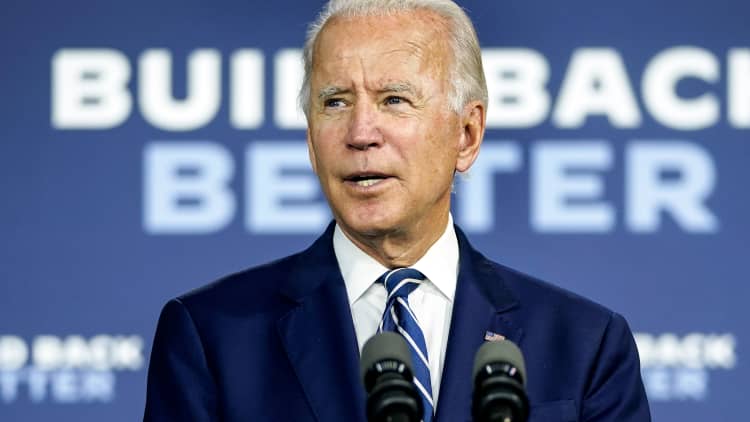
WASHINGTON — Former Vice President Joe Biden unveiled a roadmap of policy proposals Tuesday that are aimed at narrowing the generational wealth gap that persists between White Americans and their Black, Latino, Asian and Native American neighbors.
Biden's racial economic equity plan is the fourth plank in the presumptive Democratic presidential nominee's "Build Back Better" economic platform. Biden announced the plan at a speech in Wilmington, Delaware.
There, Biden drew a sharp contrast between his view of the national reckoning underway on racial justice and the ongoing protests in major cities, and the views of his opponent, President Donald Trump.
"Every instinct Trump has is to add fuel to the fire," said Biden. "It's the last thing we need. We need leadership that will calm the waters and lower the temperature. That's how to restore peace in the streets."
Biden's economic equity plan is largely a repackaging of dozens of his existing proposals from across the campaign's platforms, such as his plan to offer a one-time student debt reduction of $10,000 per student and his call for a $15 hourly minimum wage.
It also contains a separate section focused on criminal justice reform, which includes Biden's plan to eliminate cash bail and to guarantee that formerly incarcerated people are provided temporary housing upon release from prison.
It will take all of these policies working together, he said, to begin to achieve economic equality for people of color.
"How do we break the cycle? In good times, communities of color still lag. In bad times, they get hit first and the hardest. And in recovery, they take the longest to bounce back. This is about justice ... it's also about jobs, good-paying jobs. And financial stability, building wealth for families of color and passing it down to their kids."
Here are some of the key proposals in Biden's economic equity plank:
- Create a new Small Business Opportunity Fund and seed it with $30 billion of Biden's proposed $300 billion domestic innovation funding.
- Expand the New Markets Tax Credit to $5 billion yearly and make it permanent.
- Pass legislation to require the Federal Reserve to report data and trends on racial economic gaps and commit the Fed to a "real-time" payment system aimed at eliminating the time it takes for checks to clear.
The New Markets Tax Credit program awards tax credits to investors who provide capital for community development entities, which finance projects in qualified low-income communities. Created by Congress in 2000, the NMTC has supported more than 5,300 projects in the past two decades, but it is scheduled to expire at the end of this year.
Unlike the previous three planks in Biden's economic platform, the racial equity plan does not initially include demands for more federal spending. Instead, it is centered on the ways that funding Biden has already proposed in his first three planks is allocated.
Speaking to reporters Tuesday morning, senior Biden campaign advisors said more details about the costs and the funding of these proposals are forthcoming, although they did not specify when to expect the numbers.
One thing the plan does not contain is any reference to the word "reparations," despite a growing movement on the left in recent years to quantify and compensate Black Americans for centuries of slave labor and for the subsequent Jim Crow laws that denied them access to the same opportunities to build wealth that White families were given.
Grouping all of these policy proposals together under the umbrella of racial economic equity is one way for Biden's campaign to codify the former vice president's commitment to addressing the deep-seated racial injustice that has sparked massive civil unrest across the country this summer.
Biden said his plan is "about rising to this moment of crisis. Understanding people's struggles, and building a future worthy of their courage and their ambition to overcome."
Read the entire plan below.


